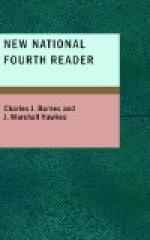Let pupils make out an analysis in six parts for the last two lessons, and use it in writing or telling the story in their own words.
[13] See third paragraph from the end of the lesson.
* * * * *
LESSON XLIV.
peas’ants, those who work on farms.
hedge’rows, rows of shrubs or trees used to inclose a space.
tow’ers, very high buildings.
an ces’tral, belonging to a family for a great many years.
mon’arch, king; ruler.
roy’al ty, kings and queens.
gifts, things given; presents.
* * * * *
COMMON GIFTS.
The sunshine is a glorious thing,
That comes alike to all,
Lighting the peasant’s lowly cot,
The noble’s painted
hall.
The moonlight is a gentle thing,
Which through the window gleams
Upon the snowy pillow, where
The happy infant dreams.
It shines upon the fisher’s boat
Out on the lonely sea,
As well as on the flags which float
On towers of royalty.
The dewdrops of the summer morn
Display their silver sheen
Upon the smoothly shaven lawn,
And on the village green.
There are no gems in monarch’s crown
More beautiful than they;
And yet you scarcely notice them,
But tread them off in play.
The music of the birds is heard,
Borne on the passing breeze,
As sweetly from the hedgerows as
From old ancestral trees.
There are as many lovely things,
As many pleasant tones,
For those who dwell by cottage hearths
As those who sit on thrones.
* * * * *
Directions for Reading.—This lesson should be read with a full and clear tone of voice. The thoughts expressed are not of a conversational nature.
In the first stanza, in the contrast between peasant’s lowly cot and noble’s painted hall, the inflections are rising circumflexes and falling circumflexes.
The rising circumflex consists of a downward turn of the voice followed by an upward turn; the falling circumflex, of an upward turn followed by a downward turn.
Let pupils mark the inflections in the last two lines of the poem.
* * * * *
Language Lesson.—Let pupils express the meaning of what is given below in dark type, using a single word for each example.
For those who dwell by cottage hearths
As those who sit on thrones.
* * * * *




